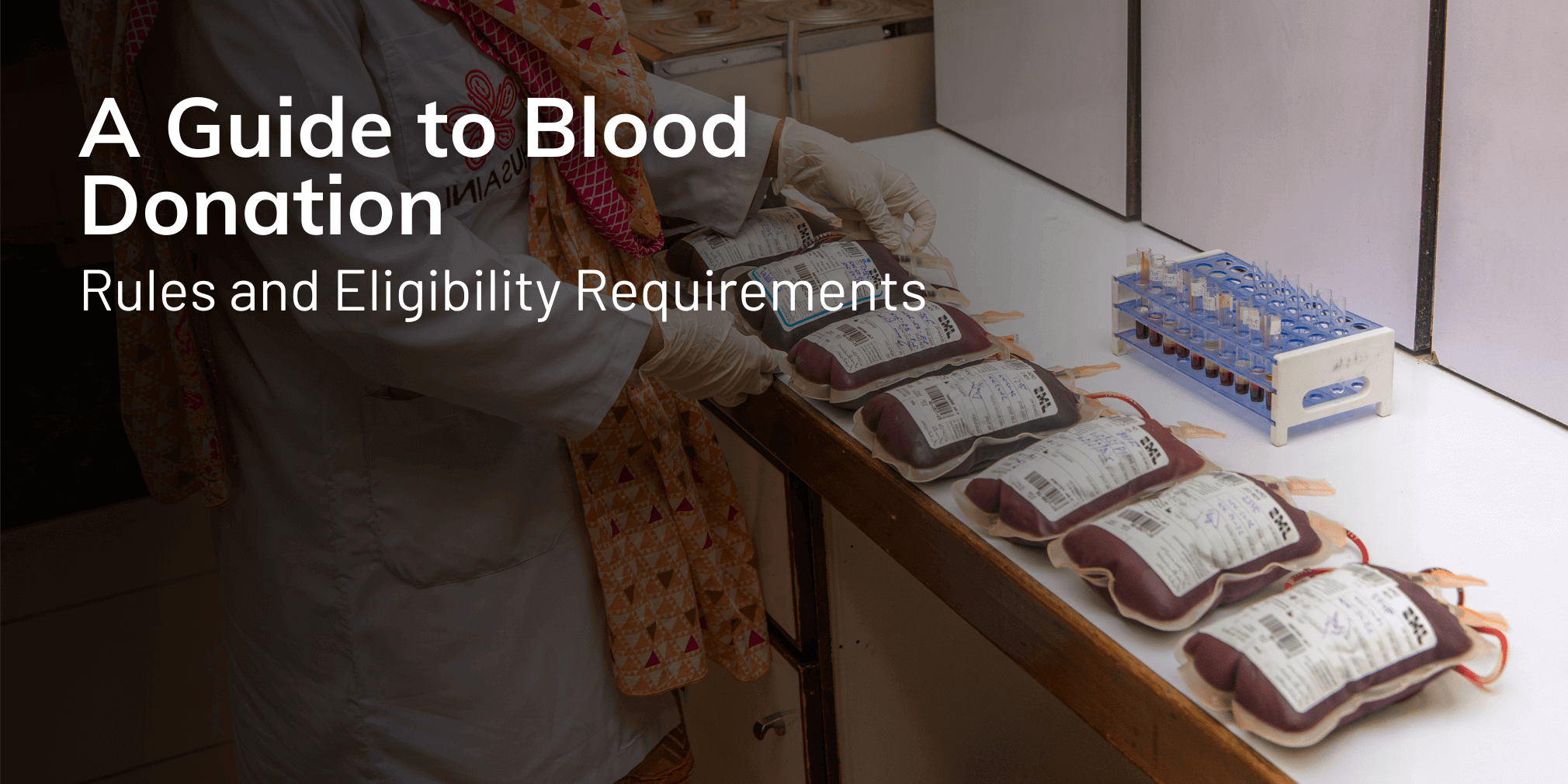
Guide to Blood Donation Rules and Eligibility Requirements
Understanding the blood donation rules and blood donation requirements is essential for first-time donors and veterans alike.
This guide demystifies the eligibility criteria, i.e., age limits, weight, health conditions (e.g., diabetes), and recovery food, to ensure a safe and impactful donation. So if you’re donating at Husaini Blood Bank or another center, knowing these guidelines helps protect both donors and recipients.
We’ll also address special situations, such as diabetes and post-donation nutrition, so you’re fully prepared to give confidently and responsibly.
1. Age & Weight Limits
Minimum Age
Most centers require donors to be at least 18 years old, though some countries allow 16–17-year-olds with parental consent. For instance, in Pakistan, the Sindh Blood Transfusion Authority sets the minimum at 18.
Maximum Age
Upper age limits vary globally. WHO suggests 60–65 years as standard, though repeat donors beyond 65 may be accepted with a physician’s clearance. The American Red Cross imposes no upper age limit if the donor is healthy.
Weight & Body Mass
Donors must weigh at least 45–50 kg (100–110 lbs) to ensure safe blood volume removal.
2. Health and Hemoglobin Levels
General Health
Donors must be in “good general health”—no current infections, uncontrolled chronic conditions, or recent surgeries.
Hemoglobin Requirements
To avoid inducing anemia:
Men: ≥ 13.0 g/dL
Women: ≥ 12.0–12.5 g/dL
Medications & Chronic Conditions
Many common medications and well-controlled conditions, i.e., hypertension, asthma, epilepsy, and diabetes, do not disqualify donors if stable. For example, diabetics are eligible if blood glucose is controlled; gestational diabetics must wait six weeks postpartum.
3. Specific Conditions: Diabetes & Pregnancy
Diabetes
- Type 1 and Type 2 diabetics can donate if their blood sugar is well-managed with lifestyle or medication.
- Inform staff about your condition and medications.
- Monitor blood sugar after donation, as HbA1c readings may shift post-donation.
Pregnancy and Breastfeeding
- Pregnant women are temporarily deferred.
- Most guidelines recommend a 6–9 month deferral post-delivery and cessation of breastfeeding before donating.
4. Travel, Tattoos, and Lifestyle Restrictions
Travel to Risk Areas
Visitors to malaria-, dengue-, or Zika-endemic regions may face a 3-month deferral post-return.
Tattoos & Piercings
- Tattoos: Donate after 6 months, or as soon as 12 hours if done in a certified facility without complications.
- Piercings: Wait at least 6 months unless the procedure was done under sterile conditions.
Lifestyle & Behavior
- Donors must avoid “at-risk” behaviors (such as unprotected sex with multiple partners or intravenous drug use) within 12 months, or permanently if HIV-positive or injecting drugs.
5. Frequency & Recovery Food
Donation Frequency
- Whole blood: every 56 days (~8 weeks), up to six times/year
- Platelets: every 7 days, up to 24 times/year
- Plasma: every 28 days, up to 13 times yearly
Suggested Recovery Food
After donation, nutrition helps restore blood components and iron stores:
- Hydrating fluids: water, juice, soups
- Iron-rich foods: spinach, legumes, lean red meats
- Vitamin C: boosts iron absorption (oranges, bell peppers)
- Protein: eggs, yogurt, chicken
Avoid heavy or greasy meals immediately after donation .
6. Maximum Age Limit & Repeat Donations
Maximum Age
- Many countries cap at 60–65 without physician approval
- Others, like the AABB and ARC, impose no upper limit if donors remain healthy
- In Pakistan, the typical upper limit set by SBTA is 60 years.
7. Step-by-Step Donation Process
- Registration & ID: Provide photo ID.
- Health Screen & Questionnaire: Cover health history, medications, travel, behaviors.
- Vital Signs & Hemoglobin Test: Check BP, pulse, temp, hemoglobin.
- Donation: Typically, 350–450 ml is collected over 8–10 minutes.
- Recovery: 15-minute rest with snacks and fluids.
- Post-donation Care: Rest, hydrate, monitor iron-rich meals for the next 24 hours.
Frequently Asked Questions
- Can a diabetic patient donate blood?
Yes, if diabetes is well-managed and blood sugar is controlled. - What is the blood donation maximum age limit?
Between 60–65 for many countries, though healthy individuals beyond that may donate with approval. - What should I eat after donation?
Focus on hydration, iron-rich meals (lean meats, greens), protein, and vitamin C to aid recovery. - Can I donate if I had a piercing done?
Wait 6 months, or shorter, after professional sterile procedures.
Conclusion
Following blood donation rules ensures safety for you and the recipients. Eligibility depends on factors like age, weight, health, and lifestyle, but many individuals, including those with controlled diabetes, can donate and make a real difference.
At Husaini Blood Bank, we uphold these standards with professional health screenings, comfortable sample collection, and expert lab testing. Visit our [Sample Collection] page to learn more, and check out [Lab Tests] to prepare for your donation.
Want to help your community and improve well-being, both yours and someone else’s? Book a donation slot today and follow our blood donation recovery food tips for quicker recovery and sustained health.
